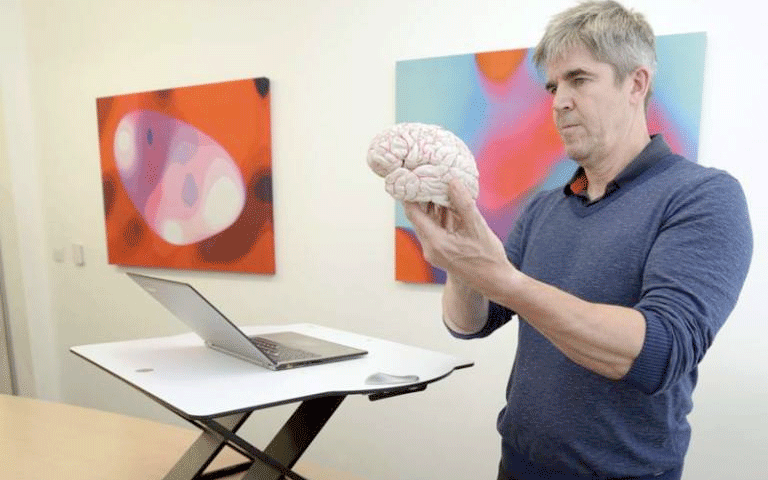Oploft, new sit-stand desks trialled at UCL
Vincent Walsh, Professor of Human Brain Research was approached by Posturite to carry out a series of behavioural experiments for a group of typically sedentary office workers.

28 August 2019
People use sit-stand desks for many different reasons
Some to combat back pain symptoms, others to prevent sitting-related health problems. But Posturite, a specialist in ergonomic furniture and equipment, wanted to explore whether sit-stand desks also have a bearing on us psychologically. Can the simple act of moving between sitting to standing throughout the day impact our cognitive functions and change the way we work?
To find out, Posturite reached out through UCL Consultants to Vincent Walsh, Professor of Human Brain Research. He devised a series of behavioural experiments for a group of 15 typically sedentary office workers. The workers were asked to carry out the tasks twice: once at the start of the five-day trial, and again at the end. During the five days, the workers were asked to use Posturite’ s new portable Opløft sit-stand platforms instead of their usual static desks.
What did the research find?
The office workers achieved significantly better results in the majority of tasks after a week of using Opløft.
Professor Walsh said “our research revealed that workers using Opløft were twice as competent in their decision-making skills, and their language-based problem skills improved by 64%. They also completed tasks measuring concentration and vigilance 10% faster and made 45% fewer mistakes. Their creativity also improved by 28%.”
While previous studies have highlighted the physical health benefits of increased activity - such as reduced risk of musculoskeletal disorders, obesity and cardiovascular diseases - this is the first study of its kind to look at how productivity and emotional wellbeing may be enhanced with access to sit-stand desks at work.
Professor Walsh’s tests were designed to measure the following abilities:
Concentration and attention span
- Task: a visual search test inviting participants to find the odd one out.
- Participants performed the task 10% faster and 45% more accurately after five days of Opløft use.
Decision-making
- Task: a version of the BART (balloon analogue risk test).
- With Opløft use, the participants’ judgement was deemed twice as reliable, making them half as likely to make a critical mistake. They also behaved less impulsively.
Improved verbal fluency
- Task: A problem-solving anagram challenge.
- Participants demonstrated better language-based problem-solving skills with the use of sit-stand desks, showing a 64% improvement from the beginning of the trial.
Positive frame of mind
- Task: An emotional stroop test.
- Unhappier people typically have a slower response to negatively emotional words when taking this test; however, Opløft users demonstrated a quicker reaction to negative words, suggesting a state of happiness.
Openness to creativity
- Task: A RAT (remote associate) test involving word association.
- Participants scored 28% higher in this creative thinking test while using Opløft, compared to when they were using static workstations.
Professor Walsh added, "The research was fairly conclusive in proving that having access to Opløft made people more productive. However, the greatest excitement was the results of the test for attention and concentration levels. Not only did our triallists perform much faster after using Opløft, but there was also a strong increase in their accuracy. People usually trade off accuracy when speed is increased, but Opløft users were able to improve both, which is impressive, and something I have never witnessed before.
Equally impressive was the results of the decision-making test. Not only did Opløft users perform better than average but they continued to improve throughout the week, which is very uncommon in this specific test.”
What does this mean for office workers?
Currently it's estimated that only 1% of UK workers use sit-stand desks, compared to 90% of Scandinavians. With mounting evidence support the physical and psychological benefits of moving at work, it is possible that static workstations will soon become a thing of the past.
Posturite’ s CEO Ian Fletcher-Price views Opløft as a revelation in sit-stand desk design. Not only does it give users the ability to stand to work, but it is also slim and light enough to be easily transported between environments.
He added further, “for centuries we have gone to work. Now, thanks to portable technology, work goes with us. The days of sitting at one desk all day are long gone. With Opløft we no longer need to be slaves to our desks because it goes where we go. Agile working gives us the freedom to choose how and where we do our work, Opløft gives us the practical means to achieve that.”
Björn Christianson, of UCL Consultants, commented: “There’s a growing interest in mental wellness and its impact on productivity. This project was an exciting opportunity, working with a partner that recognises the importance of physical and mental wellness to demonstrate that a company’s investment in giving their employees control over their workplace can lead to substantial returns.”
Images
Photo: UCL’s Professor of Human Brain Research Vince Walsh © Barcroft Media Barcroft Media via Getty Images
 Close
Close


